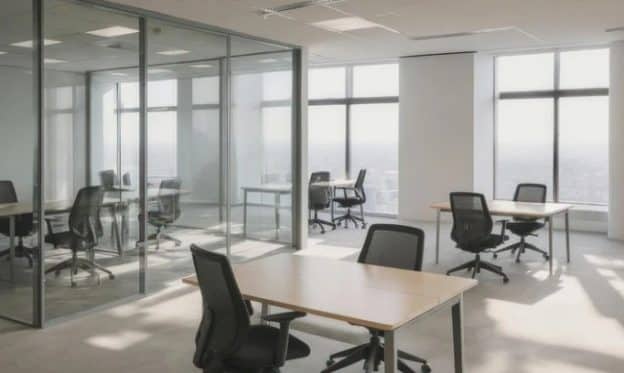Workplace design in the US is undergoing a transformation, with glass no longer treated as a passive divider but as an active force shaping atmosphere, culture, and performance. As an example banks in Buckhead and startups in Midtown deploy transparent partitions to extend daylight deep into offices, reduce visual clutter, and present a professional image that balances openness with refinement. Clean panes of glass now symbolize efficiency as much as style.
This shift reflects a citywide embrace of frameless walls, patterned films, and advanced acoustic laminates. Historic properties feel renewed as these innovations update older layouts, delivering both privacy and transparency. In a market defined by rising rents and high employee expectations, glass has moved beyond aesthetics to become both a practical solution and a strategic investment.
Frameless Glass Walls Creating Modern Atlanta Offices
Sunlight flooding a low-rise Decatur suite can make cramped desks feel twice as spacious; frameless glass provides that openness without major demolition. Clean sightlines and minimal profiles cut visual clutter, improving circulation and casual meetups. Midtown startups often swap dense partitions for these clear planes to encourage collaboration while keeping furniture and storage simple.
Law firms in Buckhead favor uninterrupted panes to present a polished, approachable face for clients while preserving oversight among partners. With expert office glass installation, local crews adapt panel sizes and edge details to fit uneven masonry and narrow corridors in older buildings, offering tempered glass and tailored hardware. A narrow floor-to-ceiling style works well for tighter spaces.
Frosted and Patterned Glass Balancing Privacy and Light
Daylight diffused through frosted glass creates soft, glowing interiors that protect conversations without isolating teams. In healthcare suites near Emory, horizontal frosting balances patient privacy with a sense of openness for staff. Buckhead firms enhance branding by cutting logos and subtle etching into panels, achieving visual identity without adding signage or distraction.
Coworking hubs in Midtown apply patterned films to open desks, breaking up sightlines and reducing strain for workers who need focus. Choosing opacity levels between 40–60% strikes a balance: panels block screens from view while allowing natural light to flow. The result is a workplace that feels both private and uplifting, functional yet visually engaging.
Branding and Custom Graphics on Glass Surfaces
Glass surfaces have become canvases for brand expression, turning partitions into bold design elements rather than background features. In Midtown, etched motifs unify open floorplans; in Buckhead, tinted panes mirror storefront palettes; and in Downtown lobbies, subtle patterns connect multiple levels while maintaining daylight and transparency. These choices take branding beyond signage, integrating identity directly into architecture.
Designers employ different methods to achieve lasting results: vinyl film offers flexibility for frequent updates, ceramic frit delivers durability under heavy use, and sandblasting provides a timeless, etched effect. Placement matters as much as technique—logos positioned at natural sightlines reduce glare while anchoring attention. This thoughtful approach turns glass into a medium where functionality, visual identity, and atmosphere align seamlessly.
Acoustic Glass Helping Atlanta Offices Reduce Noise
Open-plan offices thrive on energy, but unwanted noise often undermines focus. Acoustic glass resolves this challenge, preserving transparency while dampening disruptive sound. Sandy Springs call centers use laminated panels to contain conversations, while Downtown financial firms specify sound-rated partitions for confidential meetings. Offices near MARTA even select higher STC glass to minimize transit vibrations and background noise.
Installers layer tempered panes with resilient interlayers to absorb mid and high frequencies, while acousticians recommend real-time testing to match actual office conditions. The benefit is immediate: light-filled rooms that reduce distractions while safeguarding privacy. With acoustic glass, workplaces gain both clarity and calm, blending openness with true acoustic control.
Sliding Glass Doors Maximizing Atlanta Office Space
Space efficiency is key in Atlanta’s dense office market, and sliding glass doors answer with elegance and practicality. Midtown suites incorporate pocket systems that disappear into walls, creating flexible layouts for meetings and gatherings. In Buckhead, co-working hubs prefer sleek sliders for fluid circulation, while Decatur firms choose barn-style glass to add personality without losing efficiency.
Technical refinement makes these systems as functional as they are attractive. Low-profile tracks and recessed guides let doors glide effortlessly, while soft-close features minimize noise and protect hardware. Flush thresholds prevent tripping hazards, preserving safety along with style. The result is an environment that feels streamlined, contemporary, and unmistakably professional.
Modern offices in the US increasingly reflect a shift toward transparency, adaptability, and performance, with glass serving as both a design feature and a practical solution. Frameless partitions, frosted panels, acoustic glazing, and custom graphics redefine interiors by creating environments that foster collaboration while protecting focus and privacy. Sliding systems and specialized finishes further expand usable square footage, showing that efficiency and aesthetics can advance together. Across Midtown, Buckhead, and beyond, businesses are adopting glass solutions to strengthen culture and improve daily operations. For leaders seeking workplaces that blend productivity with sophistication, glass-based innovations remain the defining standard.

